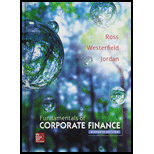
Concept explainers
Case summary:
Person C and Person GR are the founders and owners of the R Company. This company manufactures and installs heating, ventilation, and cooling units (HVAC) commercially. Both the owners have 50,000 shares of company’s stock as per the
R Company has earnings per share of $3.15 and dividends of $45,000 each were paid to the owners of the company. Moreover, there is even
Characters in the case:
R Company: The firm that wants to value their stocks
Person C: Co-owner of Company R
Person GR: Co-owner of Company R
To discuss: On how the R Company can increase its stock price.
Introduction:
Stock is a type of security in a company which denotes ownership. On issuing stocks, the company can raise capital. Stock price refers to a price of a particular share of the company.
Case summary:
Person C and Person GR are the founders and owners of the R Company. This company manufactures and installs heating, ventilation, and cooling units (HVAC) commercially. Both the owners have 50,000 shares of company’s stock as per the partnership deed. They wanted to sell their stocks and decided to value their holding in the company.
R Company has earnings per share of $3.15 and dividends of $45,000 each were paid to the owners of the company. Moreover, there is even return on equity (ROE) of 17% and the required rate of return is 14%.
Characters in the case:
R Company: The firm that wants to value their stocks
Person C: Co-owner of Company R
Person GR: Co-owner of Company R
To discuss: Whether there is any condition wherein the company’s strategy will not raise the company’s stock price.
Introduction:
Stock is a type of security in a company which denotes ownership. On issuing stocks, the company can raise capital. Stock price refers to a price of a particular share of the company.
Want to see the full answer?
Check out a sample textbook solution
Chapter 8 Solutions
Fundamentals of Corporate Finance with Connect Access Card
- 3. Explain the concept of compounding. How does compounding impact the future value of an investment?arrow_forwardWhat is the difference between a stock and a bond, and how do they function as investment options? Need help now !arrow_forwardWhat is the difference between a stock and a bond, and how do they function as investment options? Rxplarrow_forward
- What does the internal rate of return (IRR) tell you about a potential investment? Rxarrow_forwardWhy is the Weighted Average Cost of Capital (WACC) important for a company's decision-making? Explanation.arrow_forwardWhy is the Weighted Average Cost of Capital (WACC) important for a company's decision-making?arrow_forward
- How does compounding differ from simple interest, and why does compounding result in higher returns over time?arrow_forwardWhat is the relationship between bond prices and interest rates, and why does this relationship exist? Explain.arrow_forwardWhat is the relationship between bond prices and interest rates, and why does this relationship exist?arrow_forward
- How do you calculate the payback period of an investment, and what are its limitations as a decision-making tool?arrow_forwardWhat are the main components of a company's capital structure, and how does each affect the company's overall risk and return?arrow_forwardWhat does the internal rate of return (IRR) tell you about a potential investment?arrow_forward

 Intermediate Financial Management (MindTap Course...FinanceISBN:9781337395083Author:Eugene F. Brigham, Phillip R. DavesPublisher:Cengage LearningBusiness/Professional Ethics Directors/Executives...AccountingISBN:9781337485913Author:BROOKSPublisher:Cengage
Intermediate Financial Management (MindTap Course...FinanceISBN:9781337395083Author:Eugene F. Brigham, Phillip R. DavesPublisher:Cengage LearningBusiness/Professional Ethics Directors/Executives...AccountingISBN:9781337485913Author:BROOKSPublisher:Cengage


